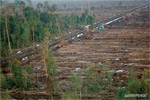Asia Pulp & Paper (APP) was offered equal space to respond to Elfian Effendi’s editorial. APP did not respond.
The editorial is a response to APP’s announcement that it will partner with Habitat for Humanity to build an “eco-village” in Java.

Rainforest in Sumatra
Indonesian Forests are “Philanthropists” for Asia Pulp & Paper (APP)
By Elfian Effendi, Director of Greenomics
There is nothing special about the assistance APP has provided to the people of Yogyakarta province in the vicinity of Mount Merapi.
For APP, Indonesian forests have acted as philanthropists for many years, subsidizing its raw materials by providing it with free timber from the country’s natural forests.
Greenomics Indonesia data (2010) shows that the value of subsidized timber provided by the Indonesian state to APP amounted to at least USD1.5 billion between 2003 and 2009. This figure represents the recorded value only, and is based on local prices, which are very low.
Imagine if APP had to import timber to support its operations between 2003 and 2009. It would have had to pay many times as much again to secure its timber raw materials.
Something that is never taken into consideration by APP is the capitalized value of the profits they have made from the free supplies of timber raw materials they have been provided with.
With subsidized timber raw materials taken from Indonesia’s forests, APP has been able to dramatically expand its business, reap enormous profits from exports, and transform itself into one of the biggest pulp and paper companies in the world.
The assistance that APP claims it has provided for the development of public infrastructure, education, healthcare, and so forth pales into insignificance compared to the value of the timber from Indonesia’s natural forests that it has been able to exploit free of charge as raw material for its operations.
Furthermore, according to an audit by the Indonesian State Audit Board, the timber from natural forests that APP has obtained as a result of land clearing operations for the development of forestry plantations between 2003 and 2008 was unlawfully obtained.
If Indonesia’s law enforcement agencies were to act on the findings of this audit, then APP would undoubtedly have to pay billions of dollars in compensation for the timber they have used as raw materials for their factories.
Whatever image APP wants to promote, it needs to acknowledge that it is only thanks to the enormous subsidy provided by Indonesia’s forests that APP has been able to become the giant pulp and paper company that it is today.
If Indonesia’s forests were able to talk, they would say, “Hey APP, we are your philanthropists!”
Related articles
Habitat for Humanity partners with controversial logging company in Indonesia
(01/27/2011) Habitat for Humanity’s Indonesian affiliate has partnered with Asia Pulp & Paper, a controversial logging company that has been accused by human rights organizations and environmental groups of exacerbating social conflict and destroying rainforests, to build a “eco-tourism village” near a famous cultural heritage site on the island of Java.
Does chopping down rainforests for pulp and paper help alleviate poverty in Indonesia?

(01/13/2011) Over the past several years, Asia Pulp & Paper has engaged in a marketing campaign to represent its operations in Sumatra as socially and environmentally sustainable. APP and its agents maintain that industrial pulp and paper production — as practiced in Sumatra — does not result in deforestation, is carbon neutral, helps protect wildlife, and alleviates poverty. While a series of analyses and reports have shown most of these assertions to be false, the final claim has largely not been contested. But is conversion of lowland rainforests for pulp and paper really in Indonesia’s best economic interest?
Scientists blast greenwashing by front groups

(10/27/2010) A group of prominent scientists has published an open letter challenging the objectivity of World Growth International, an NGO that claims to operate on behalf of the world’s poor, and its leader Alan Oxley, a former trade diplomat who also chairs ITS Global, a marketing firm. The letter, published online in several forums, slams World Growth and ITS Global as a front groups for forestry companies. The scientists note that while the groups have not disclosed their sources of funding, they assert ITS receives funding from Sinar Mas, an Indonesian conglomerate that controls Asia Pulp & Paper (APP), a forest products brand, and Sinar Mas Agro Resources & Technology, a palm oil firm, among other companies.